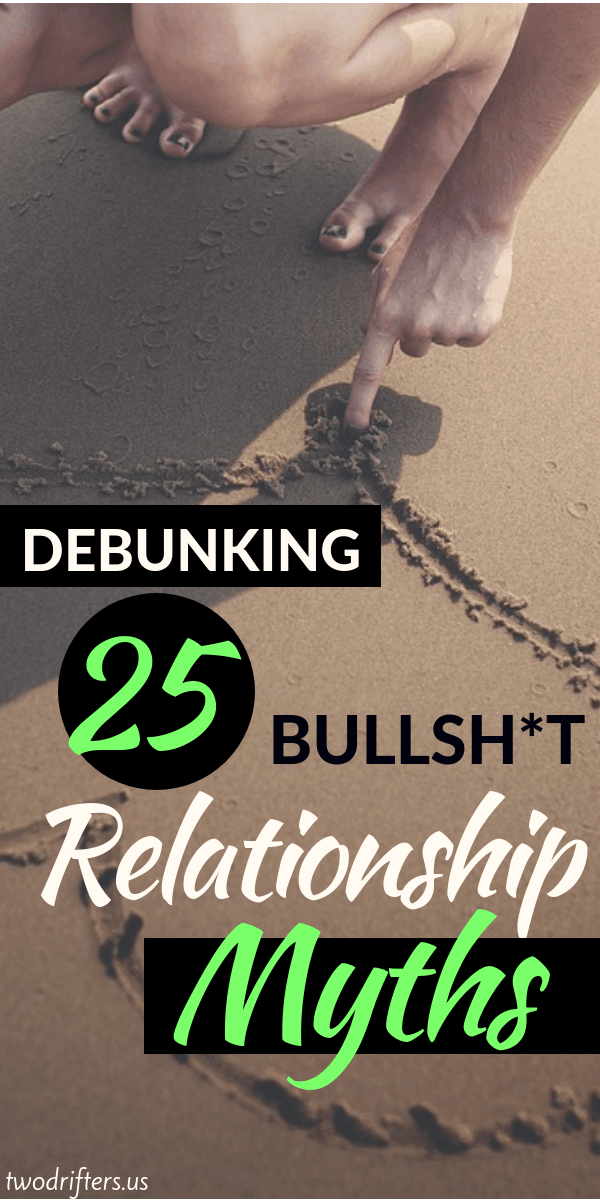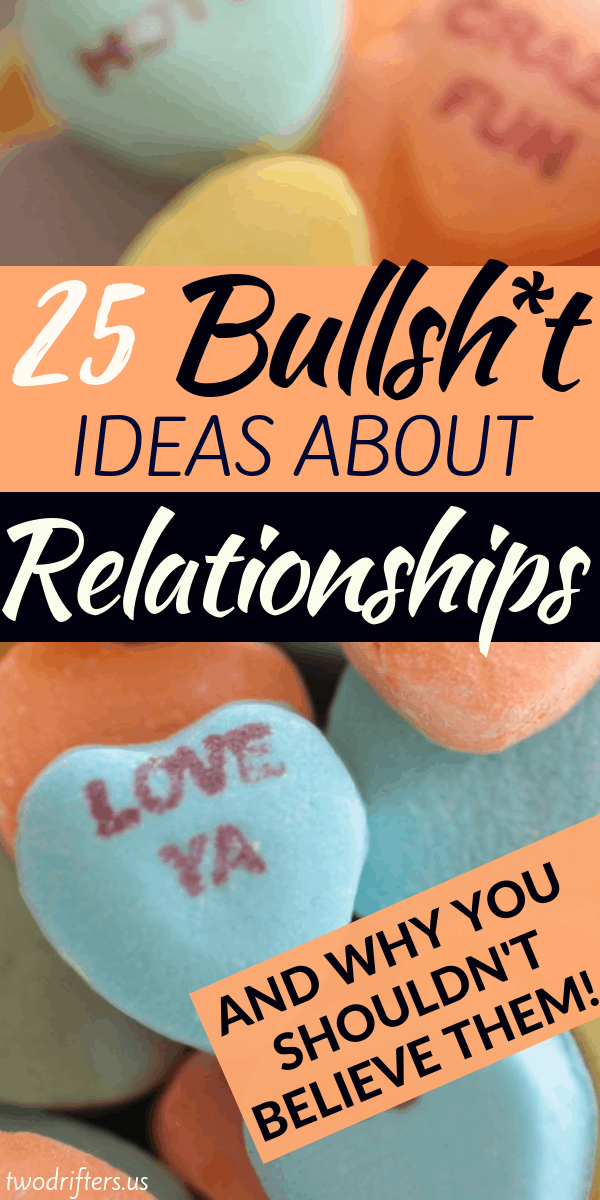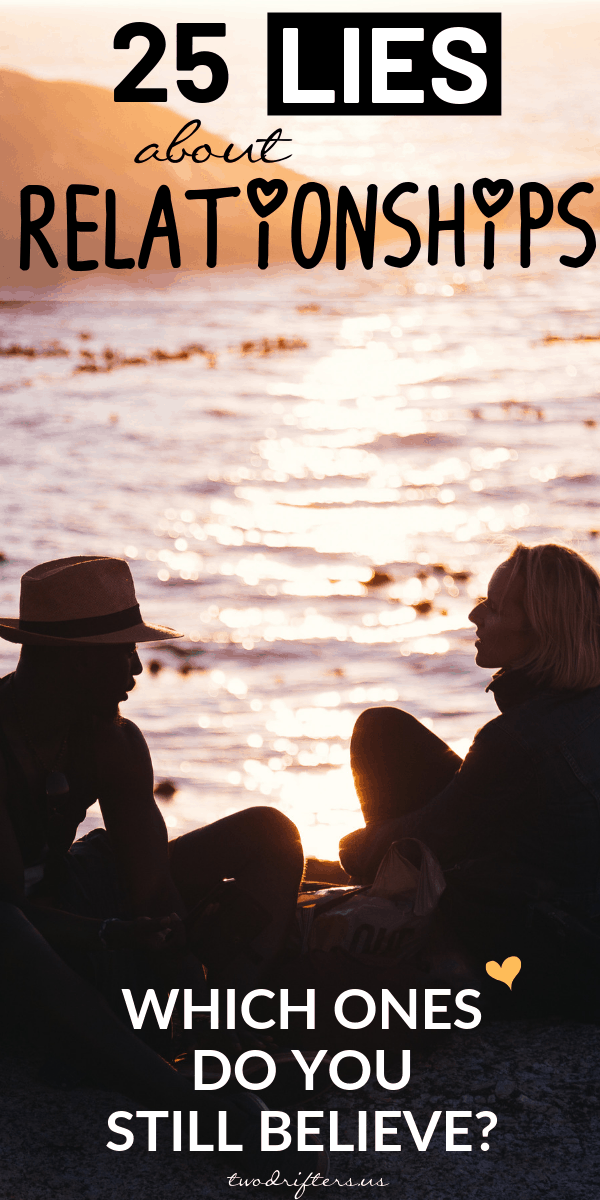This post may contain affiliate links. Read our disclosure page for full details.
In our world, there are a lot of relationship myths. These are misguided (though perhaps well-intentioned) ideas about love and relationships that our society has grown to accept as truth, spouting them to the next generations as given facts of romantic wisdom. The cycle of these love lies continues on and on, reflected in popular culture and the media.
I’m here to tell you that many of the ideas about relationships out there are absolute crap.
These types of relationship myths can be highly damaging because they are ideas that don’t match up with real people and their real feelings. They are lofty “ideals” that rarely apply in real situations. (Find reliable relationship advice for couples here!)
For instance, let’s start with one of the most pervasive: soulmates.
There’s a revolving idea that each person has one other person they are destined to be with, often called a soulmate.
Is there just one person for you? Nope. There are a great many potential partners for you out there, and the possibility for you to choose (and have a happy relationship with) any one of them.
We are in charge of our own paths and destinies. And truth be told, the idea of there being just one person that is your romantic destiny creates unrealistic expectations about partnerships, not to mention generating fear and anxiety about never finding “the one.” More on this later.
I’m especially passionate about debunking ideas surrounding relationship anxiety. Anxiety of this nature is very real and painful, but it is often brushed off with catch-all statements like “doubt means don’t” or “relationships should be easy.”
So you begin to think you always have to be 100% certain and 100% happy for your relationship to be “right.”
Nope, guys. That’s some bad advice there, and we’re going to weed through it.
Ready? Put on your practical hats cause we’re ’bout to get rational.
PS: We have a guide on what we think real love is that you should definitely check out.
Relationship Myths to Stop Believing Right Now
1. There’s one person for everyone.
Perhaps the most irritating relationship lie on the market is that there is one person out there for all of us. One person?! Out of billions?! Hell no, y’all.
Nathan and I feel incredibly blessed that we found each other… but not because we are soulmates. While we each feel so lucky to have found another amazing person, we’re not denying that there are other people out there whom we would have been compatible and even happy with. Of course, we don’t like to think of those people, now that we’re together… but the point is, there are many other awesome humans that you could build a relationship and a life with.
Personally. I feel this idea should be a relief. It takes the pressure off, doesn’t it? In our modern world, dating is hard enough; imagine if you had to hold out for that single soul that matched yours. The prospect would be quite overwhelming.
Instead, look for someone who makes you better, who encourages you to to meet your own destiny and your own potential and become the best version of yourself. Find a partner who challenges you, believes in you, and is willing to work to create a solid, lasting future with you.
It may not be destiny, but it’s two people consciously choosing to build a foundation of love and commitment. Isn’t that way more awesome?
2. Doubt means don’t.
Have some nagging doubts about your relationship? While listening to your gut is valuable and legit, there’s also the real possibility that there are other issues at play.
First, we need to distinguish normal worries or anxiety from genuine red flags. Basically, red flags center around abuse, addiction, and other ‘irreconcilable differences.” Read more on the major relationship red flags here.
But other anxieties are often just intrusive thoughts that are coming from a deeper fear within. For instance, you might have a fear such as, “What if I’m settling?” Conventional relationship advice might say, if you feel doubt, get out!
But I believe this is far from the truth. I believe a thought like that is simply a starting place for investigating your fears and your feelings. It’s time to look deeper within and find out what the anxiety is all about. What does settling mean anyway? What’s my real, core fear?
This leads me to another, similar relationship myth:
3. You need to be “100% sure” when you get married.
Oh gosh, no. Who among us is ever 100% sure about anything? There’s this idea that cold feet are a sign of a problem or that having doubt during your engagement means you shouldn’t get married, but most often, these hesitations and nerves are actually 100% okay.
Making a commitment like marriage is huge. Why wouldn’t it cause you some anxiety? It’s a life-altering, role-shifting, forever-and-ever proposition. Yikes! (Okay, not trying to scare you out of it. Marriage is awesome, I promise!) But the point is that being 100% sure is not at all required to get married. And you should know you’re in the majority if you feel, say, 70% ready before you hit the aisle. Doubt doesn’t always mean don’t.
4. You need to always feel “a spark.”
This is a tough one. We all want to feel love and feel loved. But love and excitement are different things. Love, as it grows, deepens and expands. While the early days of a relationship might involve more fluttery hearts and breathless anticipation, those heartbeats eventually slow down, and you catch your breath once more. The love deepens, but it doesn’t go away.
The key is recognizing the difference. Many people panic when they stop feeling that “spark,” not sensing that it has been replaced by a more profound and more lasting version of love and affection. You can reignite that spark over and over, but there’s no doubt that love changes and grows with us. We must embrace these changes if we want to experience the depth of a long-lasting relationship.
If we continually search for emotional excitement and novelty, we’ll never get to go the distance with someone, and I believe we’re likely to miss out on the best parts of a romantic partnership.

5. You need to have tons of sex to have a good relationship.
This idea has no doubt arisen from society’s overemphasis on sex. You might not agree with me on this point, but I definitely think there’s some misinformation about the importance of the role sex plays in our lives. Porn has perpetuated this (not to mention created some pretty insane expectations about orgasms, men’s sexual prowess, and what women like in bed, just to name a few issues).
Is sex important? Yes.
Is sex important in a romantic relationship? Yes, absolutely.
Can you have a good relationship without lots of sex? Of course.
Sexual needs are going to vary from person to person and relationship to relationship. It’s good to remember that there is no one-size-fits-all prescription for sex. (This seems like a good place to make a joke, but moving on…)
Instead, work with your partner to discover one another’s unique sexual needs and desires. Your sex life will be unique to you two, and what matters is your mutual satisfaction… no external parameters.
Here’s a great article that tackles the topic: Can You Have a Good Relationship Without Sex?
6. Fighting is a sign of a doomed relationship.
Most people today realize that some conflict and disagreement is not only normal but is downright healthy.
This isn’t to say that knock-down-drag-out brawls are indicative of a passionate, happy love story. Rather, it’s about the balance and about ensuring that your conflicts are safe, healthy, and ultimately productive.
The key is fighting fair and fighting right.
This article from the New York Times dates back to 1989, but the truth is very much evident even 30 years on:
“The most fruitful fights… were those in which the partners felt free to be angry with each other, felt they made themselves understood to their partner, and finally came to a resolution involving some degree of compromise. Such fights… give a couple the strong sense that they can weather conflict together.”
It’s worth investing time to learn how to manage conflict productively. Don’t shy away from arguments, but instead turn them into a tool for building a better relationship.
7. Playing hard to get is the best approach.
There’s not much to be said about this one. Why did the mindset of playing it cool grow so popular in dating? Why do we grow more interested in someone if he or she doesn’t act as interested or available? When is cloaking your true feelings ever the best bet? I’ve always believed in being honest and upfront. Emotional availability is important.
Perhaps there is some psychological basis for the idea that “we want what we can’t have,” but in my opinion, straightforwardness and authenticity are always the best approach. Why start your relationship off by playing games?
8. There’s a set timeline for when milestones should occur in a relationship.
It’s 2019. Things have changed. Heck, we even live longer! People aren’t necessarily rushing to marry by age 20 anymore. Marriages are happening statistically later in life (which is reported to correlate to a lower divorce rate, yay!) as people prioritize career and other ventures first.
But maybe you want to get married at 20 and start a family? You do you!
The point is, there is no standard timeline that people need to follow. The pressure to be engaged, get married, buy a house, and have kids all by a certain age is unnecessary and no doubt contributes to the existential anxiety so many of us feel.
There’s no rush to live life by your standards. We all have our own timeline, and it’s the one that is right for us.
And I should also mention, not every timeline will include all the things. Having children or even getting married aren’t for everyone. And they don’t have to be.
9. Your partner can fulfill all your needs.
Sometimes, we think that being with the right person would be/should be the answer to all our problems. But like anything, there’s no cure-all for our issues. It isn’t losing weight, landing the right job, getting married, or anything of the other things that we wish would magically turn our life around.
Sheesh, life is complicated, isn’t it?
So by the same token, our romantic partner is not designed to meet all our needs and fulfill our every expectation. No one person can do that, and it’s putting an enormous weight on the shoulders of our partner if that’s what we’re asking for.
Your partner will be a lot of things to you, including a friend, but there are also needs you must meet yourself, as well as needs that can be met by your family, your community, your occupation, your hobbies, or your faith/spirituality.
This is good to remember if you’re feeling dissatisfied in your life. When we’re looking to another person to fulfill a need for us, we can tend to project. This can turn into thoughts like “I’m bored in my relationship. Maybe we’re unhappy. Maybe we should break up,” which can spiral out of control into something bigger. But if you recognize a projection, you might discover a deeper truth.
Maybe you’re lacking community and friendship. Perhaps creativity is missing in your days. These are the types of issues that can be projected onto the wrong person, so it’s important to learn how to understand and tend to our own needs.
10. Your partner should complete you.
Dorothy Boyd told Jerry Maguire, “You complete me,” and the collective heart of the late 90s melted.
But that was just a movie. Should we really be looking for someone else to complete us and make us whole?
You guessed it–nope!
You are enough, just as you are. Partners are not designed to complete us because we are already complete and whole in our very beings. So stop looking around for the mythical person who will fix you. Realize and embrace your wholeness just as you are.
That’s not to say that a good partner won’t help to fill in the cracks and dark places in your heart and in your soul. There can absolutely be a healing nature in a committed, loving relationship, but it’s only part of the work that you have to do individually on yourself.
Read this: Do You Love Me? How to Stop Seeking Reassurance in Relationships
I also admit that there is a unity in a long-term relationship, especially marriage, that is undeniable. After all, if you subscribe to a Christian viewpoint of marriage, two people become one.
But even within that symbolism, there is plenty of room to acknowledge that real love is born of two complete people, who don’t complete one another but complement one another. Perhaps that’s what we mean when we say someone brings out the best in us.
11. In the right relationship, your feelings will never change.
This is patently false. Feelings are, by their very nature, fleeting and changeable. It’s actions and commitment that matter.
Does this mean that one day you’ll suddenly stop loving your partner? That’s highly unlikely. What it does mean, however, is that you are likely to experience periods where you don’t feel in love. Your emotional pull toward your partner might be waning. Yet at other moments, you may feel an emotional rush. This is totally okay.
These ebbs and flows are natural for a long-term relationship, and you shouldn’t panic as your partnership goes through its various stages and transformations.
What matters is to continue to be loving and act in a giving manner. You know the notion that “Love is not a feeling, it’s an action?” This is precisely where this ideology applies.
12. Getting married/having a baby will fix your relationship issues.
Every relationship will go through its tough times and challenges. But don’t be fooled into thinking that making a major life decision will eradicate your problems.
Too often, couples seem to think that a wedding or a baby will change everything for the better, erasing all their issues and propelling the relationship toward happily ever after.
While marriage and children are wonderful parts of life, they should never be looked on as a band-aid for other problems. Not only will these transitions not have the desired effect, in all likelihood, they will only magnify and worsen the issues that are already there.
Instead, work on each step at a time, prioritizing your relationship and seeking to solve major issues before trying to tackle the next big thing.
PS: Don’t be afraid to invest in couple’s therapy. It’s not just a “last resort” for marriages in trouble but a genuine tool that can help couples at all stages of life and relationships. Psychology Today is a good resource for finding a couples counselor in your area.
13. We all love/feel loved in the same way.
One of the biggest issues I see in romantic relationships is not understanding how the other person gives and receives love. This trips up many couples, and it’s not surprising. Nathan and I have experienced it firsthand in our own relationship, and learning about our love languages has been instrumental in making a difference.
According to the bestselling book that coined the phrase, there are a total of 5 Love Languages. Once you know which one(s) your partner speaks, things make so much more sense.
For instance, my major love language is overwhelmingly Words of Affirmation. To me, I feel most loved by hearing or reading words from Nathan telling me about his feelings for me. I also prefer to give love by sharing my own feelings in words.
Yet Nathan receives and gives love naturally in other ways like Quality Time and Physical Touch (read The 5 Love Languages for more on these). He has had to learn how to show me love verbally, and I’ve had to work hard to make sure I’m showing him love in the ways he needs it most.
This is a skill that all couples should acquire to ensure both partners are feeling loved, and all it takes is a bit of effort.
14. Once a cheater, always a cheater.
Mmm, this is a tough one. Infidelity is a horrible thing to go through for anyone. (I experienced it in a previous relationship and it really broke my heart).
But, ultimately, I believe people can change, and if a person is truly repentant and wants to salvage the relationship, it can be done. I cannot imagine how hard it is, but there are many incredible stories of couples bouncing back from a cheating incident and growing a deeper, stronger love.
Infidelity is often a culmination of various relationship problems coming to a head. For couples recovering from infidelity, therapy can be instrumental in helping to tackle all issues in a relationship.
Read Next: The Marriage Mistakes You Want to Avoid Making
15. There’s no love like your first love.
I definitely am calling this relationship myth out.
People often romanticize the “first love”, and in truth, these are often very special. But in no way is the love I experienced at 19 even remotely comparable to the love within my marriage.
I think it is important to remember that your first love is typically when you are young and, let’s face it, immature. So while your first romance might have the fireworks and excitement that novelty brings, it’s not wise to compare all other relationships to the first. Don’t put that first love on a pedestal.
As you grow as a human and as a partner, you’ll be gaining deeper insight into yourself and learning more and more what it means to love and commit to another person. This creates sounder relationships that definitely have more depth, and I believe this growth translates into the greatest relationships of your life, especially if both partners are growing and learning side-by-side.
16. The proposal needs to be a surprise, and it needs to be massive.
We’re living in a time when people do things bigger and bigger. It’s the era of the “promposal” when even an invitation to attend the prom needs to be an event!
Videos circulate around the internet showcasing insane proposals on top of buildings, at the bottom of the sea, or in luxurious destinations and situations. Because of this, we’ve largely come to believe that an engagement proposal should be, well, larger than life!
But trust me, this is not the case. This creates a great deal of undue pressure on everyone involved. Your darling isn’t going to say no because your proposal doesn’t include fireworks and live animals. Make it special and romantic, yes, but don’t go broke or crazy trying to create something that’s going to go viral. What matters is the two of you and the moment between you.
That said, proposals don’t necessarily need to be a surprise, either. I’m willing to bet the vast majority of engagements that occur have been discussed and planned prior to the proposal, at least to some degree. This makes sense in a time when couples often live together before engagement/marriage and when it’s increasingly common for both partners to take an equal, vocal role in planning their mutual future.
A proposal doesn’t have to be totally unexpected to be incredible. I knew almost exactly when Nathan was going to propose, but it didn’t make the moment any less beautiful, sweet, and memorable. We got engaged on a hike in Virginia, by the way, with no one around to witness it. We wanted it private and special in that way.
17. And the ring needs to cost approximately 3-4 month’s salary.
Speaking of out-dated notions, there’s an old relationship myth that says a man (or whoever is doing the proposing) should spend the equivalent of 3-4 months’ salary on the engagement ring. Egads!
This means if you’re earning $100,000 per year (which, if you are, congrats, #goals) you’d be meant to drop a cool $21k on that ring.
Do yourself and your future spouse a favor: cut that down by 1/4, and use the rest to fund your next massive expense: the wedding. Or save for your future together.

18. Relationships should be easy.
Should love be easy? Should the right relationship just work? It’s a nice idea, but the reality is that relationships are hard and relationships are work.
Relationships are work because we are human people and we are naturally flawed. And when you put two people together to share a home or a life? There’s bound to be friction.
That means that, quite often, relationships demand effort and require maintenance. Relationships are messy, complicated, and rarely simple.
But just because something is work doesn’t mean it is not incredibly worth it. Anything worth having usually asks difficult things of us; relationships are no different.
But, you may be thinking, wouldn’t things just be easier if I was with the right person?
Spoiler alert: problems in a relationship are not just your partner’s fault. In fact, you’re going to run into the same problems over and over in any relationship because YOU are one-half of the problem. You might have more compatibility with certain people, making some issues easier to deal with, but ultimately, you’re going to bring all your own crap and baggage with you to any romantic relationship.
Accept it, welcome it, and get to work.
Also see: Our 30-Day Relationship Challenge
19. You should want to be together 24/7.
There’s an idea out there that says, if you really love each other, you should be inseparable!
But most of us can readily appreciate that this is far from the truth. There’s so much to be gained and enjoyed during time spent alone or apart. And as they say, absence really does make the heart grow fonder. That’s one cliche that I actually do put stock in, even though I’ve written about how much I dislike being apart!!
Spending time on your own hobbies, with your own friends, or pursuing your own goals is extremely important. Just because you’re in a relationship does not mean you and your S.O. must be attached at the hip. Remain your own person, and you’ll have a lot more to bring to your partnership.
20. You should never feel attracted to anyone but your partner/spouse.
You’re getting married; you’re not dead!
This is a funny quote, but there’s a lot of truth there. Just because you’re in a long-term relationship or married does not mean your ability to feel attracted to other people is going to shut down.
Nope, you’re still likely to feel attracted to someone else now and then.
21. What matters is what you do with that feeling/attraction.
Unfortunately, it can be easy to fall into a gray area here or take an attraction to a dangerous place. While you can have feelings of attraction, not acting on them (i.e., not cheating or flirting mercilessly) is the mature step that keeps your relationship in the place of priority.
Speaking of flirting, there are some who think that a touch of harmless flirting can be good for a marriage. This is up to you and your partner to decide, and it’s a good idea to discuss boundaries so there’s no confusion and no one is hurt by flirting behavior, no matter how innocent.
22. Birth control is 100% the woman’s responsibility.
Fortunately, I think that the modern man generally recognizes that birth control is a two-way street. If he doesn’t, ladies, you’ve got some talking to do.
It takes two people to make a baby, so it should take two people to prevent pregnancy.
Birth control is a burden that is physical, emotional, and even financial. Together, you and your partner should look at ways to share that burden. This article offers more guidance on this topic.
23. You should never go to bed angry.
One oft-repeated piece of marriage advice is to “never go to bed angry.” The idea behind this must be that you should settle any disagreements before your heads hit the pillows.
Well, we’ve learned from firsthand experience that sometimes, going to sleep actually solves problems.
Nathan and I mostly tend to argue at night (anyone else?), which likely stems from a combination of tiredness, crankiness, and an inclination for emotions to be a little wackier in the evenings. Hence, when we occasionally fight, it’s almost always pretty late at night, and the fights are rarely rational. Sometimes they’re not even about anything important.
When we stop our conflict to let our minds and hearts rest, we almost always wake up feeling 100% better. Not only is our foolish argument of the night before all but forgotten but we’re also in a far better place to apologize to one another and get back to working as a team.
Sometimes, going to bed angry is curative.
24. Opposites attract.
This relationship myth isn’t necessarily a negative one, but I do think it deserves a closer look.
Couples frequently do form between people who have a lot of elements in opposition, but I’m willing to bet you that statistically, most of these pairs actually do share the most important things in common.
Sure, you can be short when your partner is tall. Maybe you’re an extrovert, and your lover is an introvert. Perhaps one of you is vegetarian while the other can’t get enough meat.
But your compatibility on deeper levels is probably more aligned, meaning you likely connect when it comes to values and goals. Values are a massive part of the core of who we are, and in happy couples, alignment in this area seems to be key.
So, opposites in personality or not, here are the things you should be looking for in a partner. And values are definitely on that list.
25. Marriage should always be 50/50.
Should a marriage or long-term partnership operate constantly on a 50/50 ratio? This is a challenging question.
50/50 is a ratio that makes sense; in a partnership of two, both people contribute equally to the success of the relationship.
And 100/100 makes sense too, with each individual giving 100% of their effort to the partnership.
But life happens. People encounter obstacles, hear bad news, are going through a tough time. Should they still need to give 50 or 100% to their relationship?
Our answer is no. This is a number that can be endlessly and constantly changing in a relationship. There are periods when you will be the one putting far more effort into your marriage. You might be doing more at home if your partner is ill or out of work, for instance, simply showing up emotionally if they’re suffering from depression.
In an equal and happy partnership, you don’t mind picking up some of the slack for your partner because you know they would—and will—do the same for you when the tables are turned.
Don’t become fixated on numbers or perfect ratios. This can lead to a ‘keeping score’ mentality that is harmful. Instead, be aware that relationships have seasons, and give all that you can when you can.
26. Love should be a fairy tale.
Finally, my least favorite of all the relationship myths out there: that love should be a fairy tale, and that you shouldn’t settle for anything less.
Hopefully, society is moving past this notion. Relationships should be vessels of growth and beauty, but this is often messy and complex. Rarely is any part of life like a fairy tale; eradicating our expectations of a fairy tale love story is important to appreciate the true beauty of our romantic relationships.
It doesn’t matter how your story begins, either. Despite the romantic tale of the way we met, we had struggles like any other couple. I faced challenges with constant reassurance seeking and fear of losing Nathan. We both have varying degrees of anxiety that have often come into conflict. We’ have divergent energy levels and social needs. And we’ve struggled with external problems like money. This is real stuff and it’s so normal.
So, love is not a fairy tale, and it is not a myth. It’s the real parts of a love story that are so amazing.
As you continue onward in your current relationship or any future partnerships, I hope that you will always appreciate the gritty truth of love. Dive in and do the necessary work when your relationship demands it.
Give of yourself sometimes even when you’re not getting what you need in return. Put your partner first.
Express your feelings. Tell your partner how you most like to feel loved. Argue, make up, make it better. Build something long-lasting that you can be proud of. Create a history together.
And love without reservation.

Amy Hartle is the author of Do You Love Me? How To Stop Seeking Reassurance in Relationships, a book on reassurance seeking and relationship anxiety. Both her book and this blog are born of personal experience; Amy shares expert relationship advice from the lessons learned during her own 10+ years with her husband, as well as couples travel tips and romantic getaway recommendations, all gleaned while traveling the world together.






